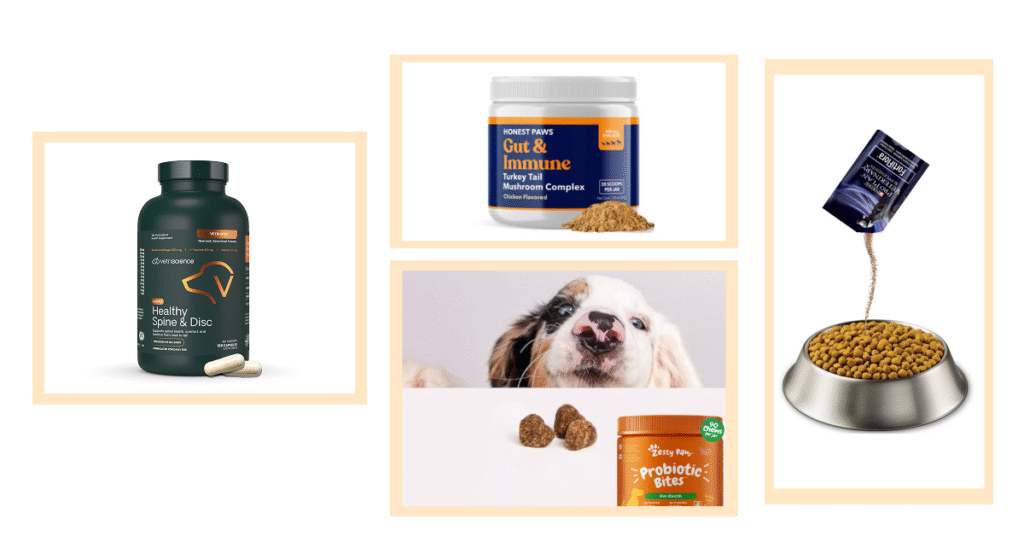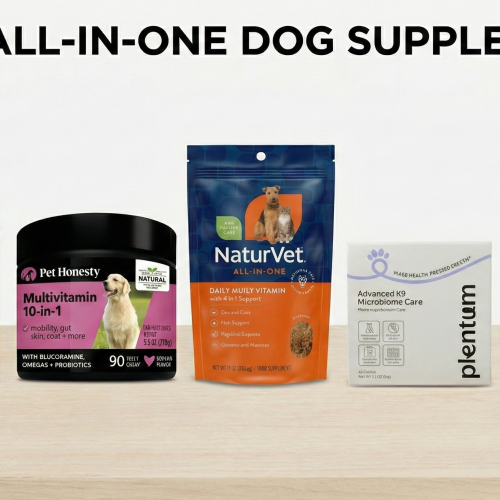The health and happiness of dogs depend on their digestion system and their gut represents the core of their well-being. A dog’s digestive system functions as a complex bacterial ecosystem because it contains billions of bacteria with both positive and negative effects. The disruption of this sensitive equilibrium results in digestive problems such as diarrhea and gas production and bloating and discomfort in dogs.
Probiotics serve as the solution. Your dog’s digestive system experiences a transformative change when you introduce beneficial bacteria. Choosing the appropriate dog probiotic product from numerous market alternatives becomes difficult for pet owners. The guide examines the top dog probiotics to assist dog owners in their selection process.
What Are Probiotics and Prebiotics?
Probiotics consist of live beneficial microorganisms which include bacteria and some yeasts that become beneficial when administered in proper amounts to deliver health advantages. The bacteria require their assistance to create a balanced ecosystem within the gut.
Prebiotics function as dietary fiber components which act as food for beneficial bacteria in your dog’s gut. The beneficial bacteria in the probiotic garden require prebiotics as they function similarly to plant fertilizers. The main prebiotics found in dog supplements consist of Fructooligosaccharides (FOS) and inulin.
A synbiotic product combines probiotics and prebiotics into a single solution which provides comprehensive gut health support.
Top Dog Probiotics for a Happy Tummy
This guide presents veterinarian-approved probiotics which have received high ratings to help manage dog digestive problems.

1. Purina Pro Plan Veterinary Diets FortiFlora Probiotic
FortiFlora stands as one of the market’s leading probiotics because veterinarians consistently endorse it for its straightforward yet effective design. The product delivers excellent results for treating diarrhea and supporting proper stool health.
The product exists as a palatable powder contained in convenient single-dose sachets. Add this powder directly to your dog’s regular meals.
- Key Strain: The formula includes Enterococcus faecium SF68 as a strain which has been scientifically demonstrated to promote both intestinal health and balance.
- CFU Count: The product contains 1×10⁸ (100 Million) CFU per sachet.
- Best for: Dogs of all sizes with diarrhea, poor fecal quality, or those experiencing stress from travel, boarding, or antibiotic use.
Link to Buy: Purina Pro Plan Vet Direct
2. Zesty Paws Probiotic Bites
These soft chews offer dogs an excellent alternative to powders because they come in appealing flavors that dogs will accept. These soft chews contain multiple probiotic strains in a strong formula which makes them popular among dogs that are finicky about their food.
- Form: Soft chews, available in popular flavors like pumpkin and chicken.
- Key Strains: A robust blend of six probiotic strains, including Bacillus subtilis DE111®, Lactobacillus acidophilus, and Lactobacillus plantarum.
- CFU Count: 3 Billion CFU per chew.
- Best for: The daily probiotic supplement works best for dogs who experience digestive issues and gas and bloating symptoms while pet owners prefer this treat-like formula. The digestive enzymes from pumpkin and papaya enhance the supplement’s benefits.
Link to Buy: Zesty Paws Official Website
3. VetriScience Vetri Mega Probiotic
This product stands out because its high-potency multi-strain formula provides strong digestive and immune system support for pets in need. Dogs who experience food allergies benefit from this product because it contains no dairy components.
- Form: Capsules that can be given whole or easily opened and sprinkled over food.
- Key Strains: The formula contains 8 different probiotic strains which include Lactobacillus, Bifidobacterium species, and Streptococcus thermophilus.
- CFU Count: Each capsule contains 5 Billion CFU.
- Best for: The supplement works best for dogs that need extensive gastrointestinal support together with immune system reinforcement and food intolerance management. The supplement contains FOS (a prebiotic) to support beneficial bacteria growth.
Link to Buy: VetriScience Website
4. Honest Paws Pre + Probiotics
The comprehensive gut health solution combines probiotics with prebiotics and digestive enzymes into a single treatment product.
The product is sold as powder which allows for convenient mixing with your dog’s food.
- Key Strains: A diverse 12-strain blend featuring Bacillus subtilis, Bacillus coagulans, and multiple Lactobacillus and Bifidobacterium species.
- CFU Count: 4 Billion CFU per scoop.
- Best for: The holistic supplement of K9 Vitality (Honest Paws) suits pet owners who want natural solutions for digestive health alongside immune system and skin care needs. The formula consists of natural components including pumpkin powder alongside papaya and ginger.
Link to Buy: K9 Vitality (from the makers of Honest Paws)
How to Choose the Right Probiotic
Before initiating any new supplement consult with your veterinarian. Your veterinarian can identify the root cause of digestive problems in your dog while suggesting the optimal treatment approach.
Examine the CFU Count: Colony-Forming Units (CFU) show the actual number of active bacteria in a dosage. Choose products which contain bacterial counts in the billions because they offer greater potency.
Different bacterial strains offer various health benefits thus you should select products containing multiple strains. A multi-strain formula often provides broader support.
A supplement containing prebiotics such as FOS or inulin will achieve better results in the long term.
Check the ingredient label to confirm that the product maintains its CFU count throughout its shelf life period.
The Bottom Line
Probiotics serve as an effective solution for dog digestive health management. A high-quality probiotic product with suitable strain combinations and potency will provide relief to your dog’s stomach while enhancing stool quality and leading to better overall health and happiness.
Disclaimer: The information presented in this article serves educational purposes while replacing veterinary guidance. Consult your veterinarian to address any health concerns about your pet.







